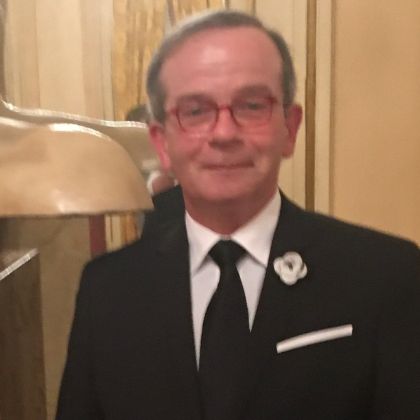1952: The war in Korea remained mired in stalemate; Julius and Ethel Rosenberg were exhausting their appeals; Senator Joseph McCarthy began to take center stage in the witch hunts of the “Red Scare” and the United States detonated the first hydrogen bomb. American popular culture took no notice. Escapism prevailed. The top grossing film by far was Cecil B. DeMille’s The Greatest Show on Earth. Sword and sandal epics along with The Caine Mutiny topped the bestseller list. Radio still ruled, but not for long – one in three households already owned a television set.
Those households tuned into the NBC Opera Theatre the evening of 16th November would have heard a very different take on the media-manufactured escapism of post-war America: Leonard Bernstein’s Trouble in Tahiti. Sam and Dinah, a successful businessman and housewife, married ten years with one child, live the dream of life in the suburbs Madison Avenue extolled, but are snared in the nightmare of their accumulated choices. They bicker, go about their separate daily lives, but long to reconnect and return to their personal Eden- “the garden where we began” – and recapture what they’ve lost. The popular idiom “trouble in paradise” lurking behind Bernstein’s title is a stage whisper announcing their fallen state and insinuating that the tree of materialism and conspicuous consumption bears poisoned fruit. It also places the opera as yet another chapter in Bernstein’s ongoing chronicle of the “Age of Anxiety” and its crisis of faith, which he considered the crisis of the 20th century.
Though Bernstein himself returned to Sam and Dinah’s life in A Quiet Place, incorporating Tahiti as a flashback, Boston Lyric Opera, with the approval of his estate, recast 1988’s song cycle, Arias and Barcarolles, as the further musings of Sam and Dinah, assigning some of its music to Tahiti’s vocal trio to create Sam and Dinah Say Goodnight (Scenes from a Marriage). David Angus led a peppy jazz combo of seven in a reduction by Bernard Yannotta, then joined Brent Hodgdon at the piano for the four-hand accompaniment to Arias and Barcarolles while also orchestrating its sixth song, At My Wedding. The resulting hybrid succeeds thanks to the creativity of all involved. Other companies should not hesitate to consider it.
Continuity and contrast knit the two pieces together. The BLO’s adept and versatile trio continued to function as a miming, singing Greek chorus; Aria’s songs were set in the same places: home, Sam’s office, Dinah’s therapist, a street in the rain, and Tahiti’s projections of color photos and graphics washed in the palette of Gauguin’s South Seas paintings recurred, drained of color or as stark white line drawings on black backgrounds whose lines fracture, collapse, then recompose themselves. Tahiti, encompassing a day, is an exuberant, eclectic, embrace of America’s colorful vernacular music: jazz, blues, scat singing, the Broadway/movie musical, advertising jingles, pop ballads, and of the classical music of Ravel, Schoenberg, and Copland. Bernstein’s use of the twelve-tone row, discreet in Tahiti, dominates Aria’s episodic narrative and its sparse, keen, more monochromatic score. Aria’s postlude, “Nachtspiel,” a slow, unearthly waltz performed by the five singers humming a descant, opened and closed the opera.
Moorish-patterned drapes lit from behind marked the perimeter of the performing space, transforming an ice rink into an evocation of a classic nightclub with banked rows of seats on three sides, a raised stage on the fourth, and tables on the floor. The lobby was repurposed as a pre-show lounge whose offerings patrons could take to their seats. The counterpoint of the cabaret milieu accentuated the bleaker aspects of Bernstein’s texts. It fell to the soloists to reveal the hope and yearning for something better in the thicket of the libretto’s recriminations and expressions of estrangement. Singing with warmth, sincerity, and complete immersion in their roles, Marcus Deloach and Heather Johnson created sympathetic, layered, personas out of characters who can seem off-puttingly self-absorbed. They also shifted fluidly through the various vocal genres and styles Bernstein deploys. Deloach faced the additional challenge of context, with the #MeToo moment casting his exchange with his secretary and “There’s A Law About Men” in the unforgiving light of toxic masculinity. Johnson shaped Dinah’s dream – the poignant, Coplandesque “There Is A Garden” – into the evening’s earworm and her “What A Movie!” into a madcap mad scene triggered by the “escapist, technicolor twaddle” of Bernstein’s spoof of a formulaic, Dorothy Lamour-type movie extravaganza, Trouble in Tahiti.
Bernstein would like us to believe, like Dinah, that “love will lead us to a quiet place”. Trouble in Tahiti leaves that possibility open. BLO’s hybrid, however, suggests that Sam and Dinah finally find it.


